How to fish Dereck's Pool on the Welsh Dee at Llangollen
Introduction
Dereck’s Pool is a short, tree-lined pool that can be fished from both banks using the fly. However, most anglers fish it from the right bank because it’s easier to access.
Grayling and trout are your main quarry when fishing Derek’s pool. In addition, salmon are occasionally caught when fishing the pool with the spinner.
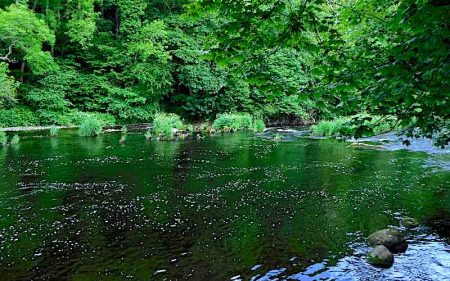
How to get to Dereck’s Pool?
To access the right bank, take the A5 to Corwen from Llangollenthen. After the junction with the B5103 by Berwyn Station, take the next right and follow the lane for 1 mile. Near the end of the lane, you will see the top car park on your left. If you reach Pen Dre farmhouse, you have passed the parking.
Walk down the lane about 50m to the style on your right. Once in the field, follow the fence on your left down to the river, turn left, and step over the style into the next field. Dereck’s Pool is on your right.
At the end of this guide, a Google direction locator has been added to help with directions.
How to fish Dereck’s Pool for trout and grayling:
It’s not easy to fish Dereck’s Pool with the fly because both banks are lined with overhanging trees. This pool is difficult to wade because it’s strewn with large boulders and contains deep gullies, which have been scoured out of the bedrock.
Some good trout and grayling hold in the deep gullies toward the tail of the pool. Therefore, it’s worth fishing when the river is running clear and close to its summer level.
As a rule of thumb, I only fish Dereck’s if the river level is below 0.6m (Manley Hall gauge).
Just be extremely careful if you decide to wade this pool.
Fishing Dereck’s Pool from March to September:
March signals the start of spring and, on the 3rd of March, the Welsh Dee brown trout fishing season. However, the weather in March is often more winter-like than spring.
When it has been a wet winter, the river is usually too high to fly fish Dereck’s pool; I skip this pool if the river level is above 0.6m (Manley Hall gauge).
Fly fishing Dereck’s Pool in March:
On mild days, hatches of Large Dark Olives and March Browns start at ca. 11 am, and you’ll often spot trout eagerly picking them off as they drift through this pool.
It’s best to target these rising fish by fishing a dry fly (large dark olive or March Brown).
Alternatively, fishing a team wet flies on a floating line often yields some beautiful over-wintered brown trout. The team of early-season of wet flies/spiders I find successful is a size 14 March Brown Spider (top dropper); a size 14 black hopper (middle dropper); and a size 12 pheasant tail nymph (point fly).
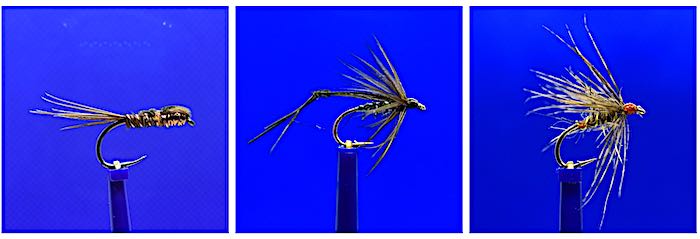
If either of the above fails, I will try my luck fishing the pool with a couple of nymphs suspended under a sight fly (Klink & Dink method).
The following post contained more information on my fly selection for March…
Fly fishing in April:
Usually, April brings warmer weather, and fly hatches become more prevalent from mid-morning to mid-afternoon. (Large Dark Olives, March Brown, Grammon). Providing more opportunities to catch brown trout on the dry fly by matching the hatch.
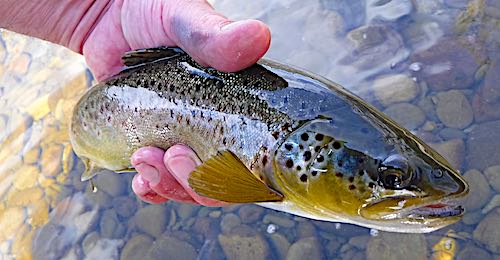
The following post contains more information on my fly selection for April…
Fly fishing in May:
As the weather warms and dries up during May, fly hatches become prolific and brown trout become egaer to fatten up on the emerging fly life. Examples of flies you will see include:
Up-winged flies:
Sedges:
- Black sedge
- Grannom
- Cinnamon sedge
- Medium sedge
Others:
- Hawthorn fly
- Alderfly
- Large stonefly
- Midges
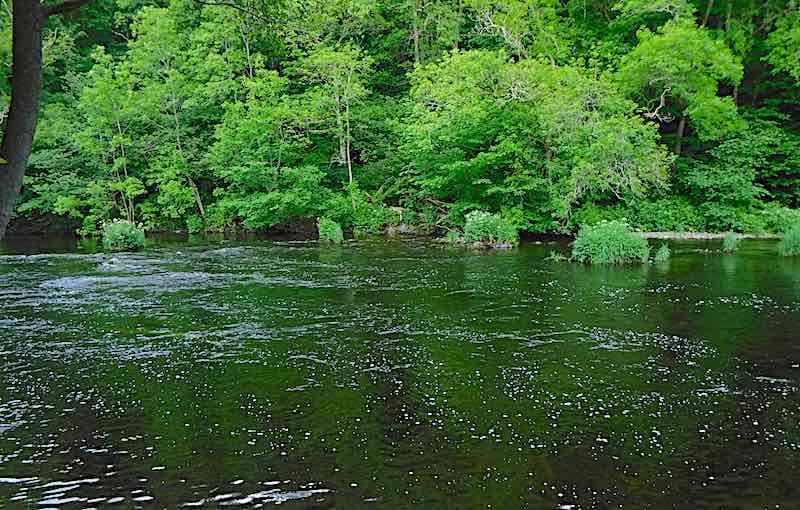
As a result of the abundant fly-life, May is when dry fly fishing and upstream wet fly fishing produce the best catch results. Especially when you’ve identified which flies the trout are taking.
The river flows south through Dereck’s Pool and can be fished until late morning on sunny days because the banks are tree-lined. Then again, when the sun begins to drop in the afternoon.
On overcast days, the fishing can be good from morning to dusk.
Fly fishing from June to September:
When the river is low during the summer months, Dereck’s Pool is a good place to fish because the fast riffle above replenishes the oxygen levels in the water. On sunny days, it is the best fishing is early in the morning and after 6 pm.
More information on the fly selection for summer is covered in the following posts.
Fishing from October to February:
My attention turns to fly fishing for grayling from October to the end of February on the Welsh Dee.
River conditions during autumn and winter often dominate my grayling fishing activities. I only fish Dereck’s Pool when the river is less than 0.6 m (Manley Hall gauge) and running clear.
Usually, Dereck’s Pool holds a few large grayling but not large shoals.
Fly fishing in October:
During October on the Welsh Dee, fly hatches are still common on most days. The flies you are likely to see hatching include:
- Large Dark Olive
- Iron Blue Dun
- Pale Watery Dun
- Midges
The approach to fly fishing Dereck’s Pool depends on river height, water, and weather conditions. October mornings tend to be cool, and it’s mid-morning before fly hatches start.
If I’m on the river before 10 am, I start fishing the pool from close to the bank with a team of wet flies by casting the flies across to the far bank and allowing them to swing round to the dangle.
My default wet fly recommendation is the following team of three flies cast on 3lb copolymer (point: March Brown spider #14; middle dropper: black hopper #14; top dropper: claret spider #16).
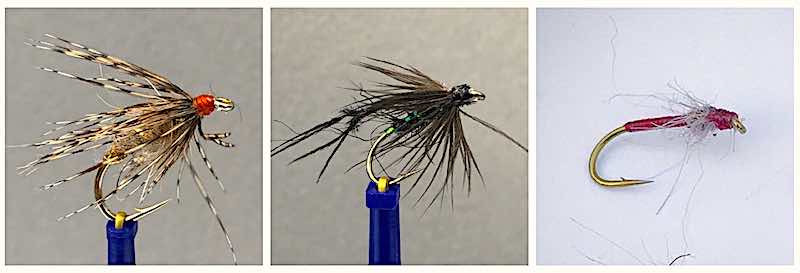
Once flies are observed hatching, I switch to targeting the rising grayling with the dry fly. Ideally, it’s best to try and identify the flies that are being taken and tie on a suitable imitation.
When it’s not possible to identify the hatch, I start with a CDC olive emerger pattern. Often that approach catches fish, but when it doesn’t, I work through my fly box.
Usually, one of the following three dry flies will catch grayling…
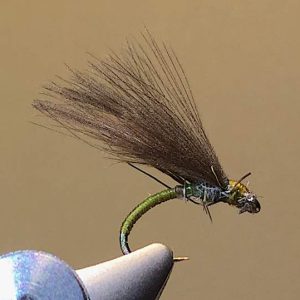
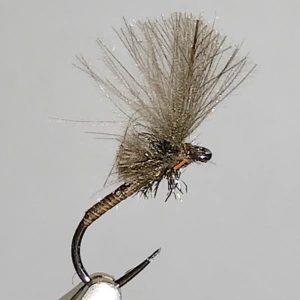
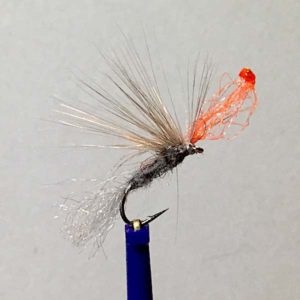
On rare occasions, the above approaches fail to tempt grayling. Then, it’s necessary to switch to fishing nymphs close to the riverbed.
In Dereck’s Pool, this is best achieved using the ‘Klink & DInk’ method to search the deeper channels within the pool.
Check out the link below for additional reading on flies for October…
Fly fishing in November:
The clocks go back at the end of October, and the days get increasingly shorter during November. With aquatic life becoming dormant for winter, fly hatches are sparse, and grayling are increasingly searching the riverbed for food: nymphs, larvae, worms, etc.
Fishing for grayling in November can be a great sport because they have to feed hard to ensure they are in peak condition for spawning in spring.
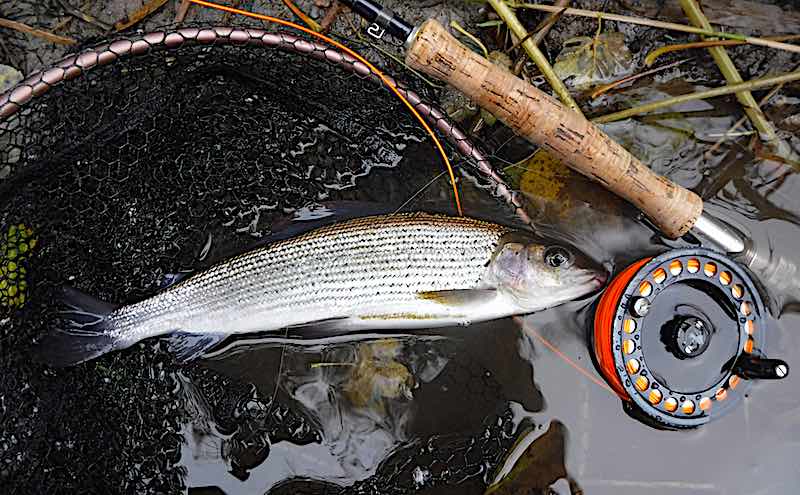
On November mornings, fishing a team of nymphs under a bung often yields the best results.
On mild days, sporadic hatches of olives usually occur around lunchtime. If this happens, then switching to fishing dry or wet flies often is the best approach.
The following article contains more information on the flies to use on the Welsh Dee during November…
Fishing in December, Jan & Feb:
Once winter sets in, I rarely fish Dereck’s Pool for grayling because they have started to shoal in the larger pools. For example, Dee Farm, Pipe Pool, etc. In addition, the Welsh Dee is often in flood during the winter months, and Dereck’s Pool is unfishable.
Fishing Dereck’s Pool for salmon & sea trout.
I rarely fish Dereck’s Pool for sea trout and salmon with the fly because it’s difficult to cast a line. However, it is fishable with a spinner, which occasionally catches sea trout and salmon.
Where do I get day tickets?
The Dereck’s Pool is part of the Llangollen-Maelor Upper beat, day tickets for visiting anglers can be obtained online.
For additional information, please get in touch with the club.
Directions and parking for Dereck’s Pool
To access the right bank, take the A5 to Corwen from Llangollenthen. After the junction with the B5103 by Berwyn Station, take the next right and follow the lane for 1 mile. Near the end of the lane, you will see the top car park on your left. If you reach Pen Dre farmhouse, you have passed the parking.
Like most outdoor sports, fishing is not without its hazards. Therefore, YOU MUST DO YOUR OWN RISK ASSESSMENT before starting to fish Dereck’s Pool. Especially if you decide to wade and/or fish at night. In addition, you must follow the Llangollen-Maelor Club Rules when accessing and fishing this water.